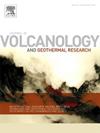卫星测量爆炸性火山喷发后的森林扰动、恢复和沉积物分布情况
IF 2.4
3区 地球科学
Q2 GEOSCIENCES, MULTIDISCIPLINARY
Journal of Volcanology and Geothermal Research
Pub Date : 2024-10-09
DOI:10.1016/j.jvolgeores.2024.108204
引用次数: 0
摘要
森林破坏的特征和程度以及随后的恢复模式反映了爆炸性火山爆发的强度,有可能成为火山爆发规模和影响的新替代物。2015 年智利卡尔布科火山爆发后,我们利用卫星测量植被破坏情况和恢复模式,评估了火山爆发对周围温带森林的影响,以及受不同沉积类型影响的地区在火山爆发后的恢复情况。卡尔布科火山爆发造成了数百平方千米的火山灰沉积、6 千米的火成碎屑流和 15 千米的拉哈斯。我们通过时间序列分析、聚类和恢复时间尺度估算,探索了从光学图像(2013 年 6 月至 2023 年 5 月)以及雷达反向散射和相干性(2014 年 10 月至 2023 年 6 月)中得出的 NDVI,以发现森林扰动和恢复的模式。我们发现,森林破坏和恢复主要与沉积物类型、厚度和扩散方向相对应。最厚的凝灰岩沉积物(40 厘米)与最严重的植被损失相关,因此我们的植被影响图使我们能够完善凝灰岩沉降-沉积等距线的空间分布图,从而得出 0.28 平方公里的修正喷发体积。植被恢复率与最初的冲击类型和强度有关,也与当地的地形、地势和海拔有关。我们的研究结果展示了光学和雷达卫星遥感在通过植被扰动确定火山爆发范围和规模方面的新颖应用。我们的研究结果表明,测量植被扰动,尤其是在偏远和植被茂密的环境中测量植被扰动,有助于完善对难以进入或受损严重地区的实地分析。本文章由计算机程序翻译,如有差异,请以英文原文为准。
Satellite measurement of forest disturbance, recovery and deposit distribution following explosive volcanic eruptions
The characteristics and extent of forest damage, and the subsequent patterns of recovery, reflect the intensity of an explosive volcanic eruption and have the potential to be a novel proxy for eruption magnitude and impact. Using satellite measurements of vegetation damage and recovery patterns, following the 2015 explosive eruption of Calbuco, Chile, we assess the impact on surrounding temperate forests and how areas impacted by different deposit types recover post-eruption. The Calbuco eruption resulted in tephra deposition over hundreds of square kilometres, pyroclastic flows extending 6 km and lahars extending 15 km. We explore NDVI derived from optical imagery (June 2013–May 2023) as well as radar backscatter and phase coherence (October 2014–June 2023) through time series analysis, clustering and estimation of recovery timescales to find patterns in forest disturbance and recovery. We find that forest damage and recovery correspond primarily with deposit type, thickness and dispersal directions. The thickest tephra deposits ( 40 cm) correlate with the most vegetation loss, so our vegetation impact maps allow us to refine the spatial mapping of tephra fall-deposit isopachs to give a revised eruption volume of 0.28 km3. Vegetation recovery rates relate to initial impact type and intensity, but also local topography, aspect and altitude. Our results demonstrate a novel application of optical and radar satellite remote sensing to determine eruption extents and magnitudes through vegetation disturbance. We show that measuring vegetation disturbance, particularly in remote and densely vegetated environments, can help refine field-based analyses in inaccessible or intensely damaged zones.
求助全文
通过发布文献求助,成功后即可免费获取论文全文。
去求助
来源期刊
CiteScore
5.90
自引率
13.80%
发文量
183
审稿时长
19.7 weeks
期刊介绍:
An international research journal with focus on volcanic and geothermal processes and their impact on the environment and society.
Submission of papers covering the following aspects of volcanology and geothermal research are encouraged:
(1) Geological aspects of volcanic systems: volcano stratigraphy, structure and tectonic influence; eruptive history; evolution of volcanic landforms; eruption style and progress; dispersal patterns of lava and ash; analysis of real-time eruption observations.
(2) Geochemical and petrological aspects of volcanic rocks: magma genesis and evolution; crystallization; volatile compositions, solubility, and degassing; volcanic petrography and textural analysis.
(3) Hydrology, geochemistry and measurement of volcanic and hydrothermal fluids: volcanic gas emissions; fumaroles and springs; crater lakes; hydrothermal mineralization.
(4) Geophysical aspects of volcanic systems: physical properties of volcanic rocks and magmas; heat flow studies; volcano seismology, geodesy and remote sensing.
(5) Computational modeling and experimental simulation of magmatic and hydrothermal processes: eruption dynamics; magma transport and storage; plume dynamics and ash dispersal; lava flow dynamics; hydrothermal fluid flow; thermodynamics of aqueous fluids and melts.
(6) Volcano hazard and risk research: hazard zonation methodology, development of forecasting tools; assessment techniques for vulnerability and impact.

 求助内容:
求助内容: 应助结果提醒方式:
应助结果提醒方式:


